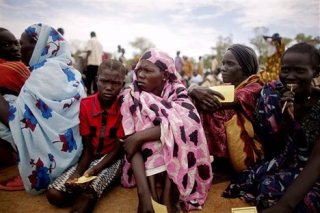South Sudanese official objects to Misseriya representation in Abyei
June 25, 2012 (JUBA) – The chair of the parliamentary committee responsible for member affairs at the National Legislative Assembly, Mark Nyipuoc Ubong, said on Monday that the legislative council for the contested Abyei region should not include members of the traditionally Khartoum-aligned Misseriya ethnic group.

Juba says it accepted to that the speaker of Abyei legislative assembly be nominated by Khartoum but it received assurances that he would be picked from the Nogk Dinka. But the Sudanese government and the mediation say they ignore such gentleman agreement.
Ubong, who is also chair of the ruling Sudan People’s Liberation Movement (SPLM) office in his home state of Western Bahr el Ghazal, said that Juba had been “responsive to international calls to negotiate with the government in Khartoum” but that the 2009 Permanent Court of Arbitration ruling defined they Abyei region as the territory belonging to the nine Ngok Dinka chiefdoms; and that the Missreiya should therefore not have a position in its administration.
An unresolved element of the Comprehensive Peace Agreement which ended the Sudanese civil war in 2005, and paved the way for South Sudan’s secession in 2011, has been the status of the traditional bridge between the two regions which are now countries: Abyei.
Both the extent of the borders of the region and the eligibility of residents to vote in a poll on the region’s future status have been contentious.
The Misseriya are a nomadic group who spend around six months of the year in the Abyei region. Khartoum, whom the Misseriya traditionally back, says that they should be able to vote in the poll on the future of Abyei’s status. Juba disagrees, claiming that the traditionally South Sudan aligned Ngok Dinka should decide the region’s future status.
After thousands of people were displaced when Abyei was overrun by Khartoum’s forces in May 2011, allegedly in response to South Sudanese troops aggression, the UN Interim Security Force for Abyei (UNISFA) was established to police the region.
Since then both Juba and Khartoum claim to have withdrawn their troops from the region.
However, the PCA did not rule of the eligibility of various ethnic groups to vote.
Ubong claims that Khartoum “has no intention to implement agreements that have been signed” and is now “changing agendas of the negotiations from security to the border” in order to “buy time”.
He also reiterated Juba’s allegation that Abyei is still occupied by Sudanese soldiers dressed in police uniforms in defiance of the Security Council Resolution 2046 which does not permit forces either allied or loyal to the two sides to remain in Abyei other than UNISFA troops.
Luka Biong Deng, a chief representative to the South Sudan’s president Salva Kiir in the Abyei Joint Oversight Committee (AJOC), said Juba will accept a local administration containing members of Khartoum’s National Congress Party, but preferably by members from the Ngok Dinka ethnic group.
Biong told Sudan Tribune in an interview on Sunday from Abyei that the area is witnessing a “massive return” of people who fled the area during the 2011 armed conflict.
He also described seeing “a lot of developments taking place since I returned to the area after participating in the first round of talks which resumed in Addis Ababa, Ethiopia.”
Although he witnessed a large-scale return of the residents, most of whom are women and young people, he said some are still hesitant about the move due to the presence of armed elements in the region.
He said there are 32 official soldiers from both Sudan and South Sudan, forming the security monitoring committee and that the rest are illegal.
Compounding the lawless atmosphere, he noted that on Saturday criminals stole cows belonging to the returning Dinka Ngok population but that UNISFA is handling the case.
He added that the Sudanese government has not until now been able to sign the Status of Force Agreement which is required to regularise operations of the UNISFA force and maintain forces in Kej (Diffra) and all areas.
“Sudan keeps 150 forces in the Abyei area. These force are in Diffra and oil areas north of Abyei”, he claimed adding that rain had prevented him venturing for investigations further afield.
He said he has held meetings with local administration and the UNISFA Deputy Force Commander to brief them on diplomatic efforts being exerted to resolve disputes, particularly the progress being made in Addis Ababa, where the two sides are expected to resume discussion on Abyei on July 5.
(ST)
